

Chap07. Rubric. Dr. Alice Christie's Web Site Evaluation Rubrics. Rubrics for Evaluation Websites. Intermediate Grades may use this rubric for evaluation purposes.
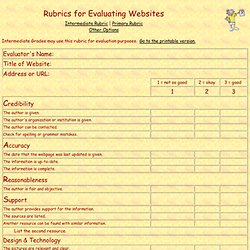
Go to the printable version. * Rubric based on Harris's CARS Checklist. "Look What's On the Web! " Printable rubrics for early primary grades and for 2nd and 3rd graders designed by Becky Trieger of the Springfield Ball Charter School. Use the following links to find a variety of rubrics to use for evaluation.
Return to Northwest SchoolTechnology HandbookTable of Contents. Evaluating Online Resources. Sign In Georgia Department of Education > Curriculum, Instruction and Assessment > Curriculum and Instruction > Evaluating Online Resources Evaluating Online Resources Cyberguide Ratings For Content Evaluation A guide for rating the curriculum content on websites.
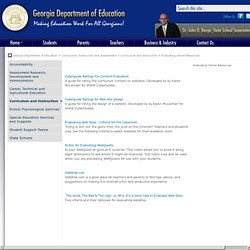
Developed by by Karen McLachlan for WWW CyberGuides. Cyberguide Ratings for Web Site Design A guide for rating the design of a website. Evaluating Web Sources. Not all sources on the Web are equally valuable or reliable.
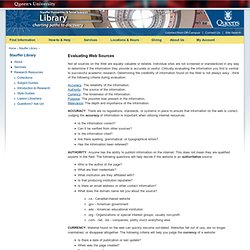
Individual sites are not screened or standardized in any way to determine if the information they provide is accurate or useful. Items to Consider - Evaluating Information Found on the Internet - Library Guides at Johns Hopkins University. Evaluating Web Sites - UMUC Library. Welcome to this Information and Library Services Tutorial on evaluating Web sites.
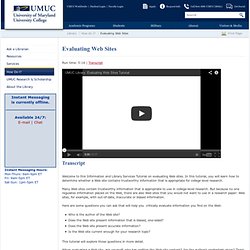
In this tutorial, you will learn how to determine whether a Web site contains trustworthy information that is appropriate for college level research. Many Web sites contain trustworthy information that is appropriate to use in college-level research. Evaluating Web Pages: Techniques to Apply & Questions to Ask. 1.
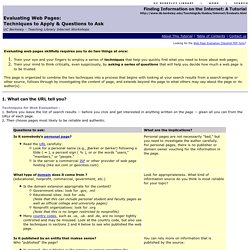
What can the URL tell you? Techniques for Web Evaluation : 1. Before you leave the list of search results -- before you click and get interested in anything written on the page -- glean all you can from the URLs of each page. 2. 2. 1. INSTRUCTIONS for Truncating back a URL: In the top Location Box, delete the end characters of the URL stopping just before each / (leave the slash). Continue this process, one slash (/) at a time, until you reach the first single / which is preceded by the domain name portion. 3. Evaluate Internet Resources. The Internet is a wonderful avenue to explore for information.
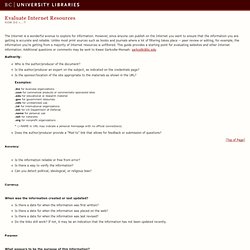
However, since anyone can publish on the Internet you want to ensure that the information you are getting is accurate and reliable. Unlike most print sources such as books and journals where a lot of filtering takes place -- peer review or editing, for example, the information you're getting from a majority of Internet resources is unfiltered. This guide provides a starting point for evaluating websites and other Internet information. Additional questions or comments may be sent to Kwasi Sarkodie-Mensah: sarkodik@bc.edu Authority:
Evaluating Web Sources § Harvard Guide to Using Sources. Although you should generally begin your electronic research by using e-resources available through the Harvard Library, there may be times when you will want to use popular Web search engines like Google.
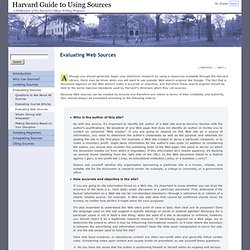
The fact that a document appears on the Web doesn't make it accurate or objective, and therefore these search engines should be held to the same rigorous standards used by Harvard's librarians when they vet sources. Because Web sources can be created by anyone and therefore are riskier in terms of their credibility and authority, they should always be evaluated according to the following criteria: Who is the author of this site? As with any source, it's important to identify the author of a Web site and to become familiar with the author's qualifications. Be skeptical of any Web page that does not identify an author or invites you to contact an unnamed "Web master. " Evaluating internet information. Information comes to us from a wide variety of sources.
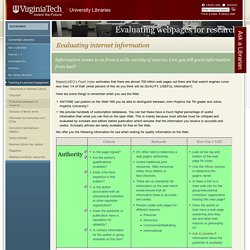
Can you tell good information from bad? MajesticSEO's Fresh Index estimates that there are almost 700 billion web pages out there and that search engines cover less than 1/4 of that! (what percent of this do you think will be QUALITY, USEFUL information?) Evaluating Web Sites: Criteria and Tools. Evaluating Internet Resources. Unlike similar information found in newspapers or television broadcasts, information available on the Internet is not regulated for quality or accuracy; therefore, it is particularly important for the individual Internet user to evaluate the resource or information.
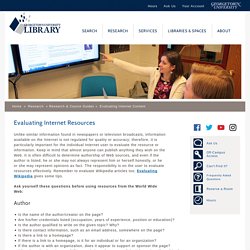
Keep in mind that almost anyone can publish anything they wish on the Web. It is often difficult to determine authorship of Web sources, and even if the author is listed, he or she may not always represent him or herself honestly, or he or she may represent opinions as fact. The responsibility is on the user to evaluate resources effectively. Remember to evaluate Wikipedia articles too; Evaluating Wikipedia gives some tips. Evaluating Internet Sources. The questions below will help you in evaluate web pages for use as academic sources.
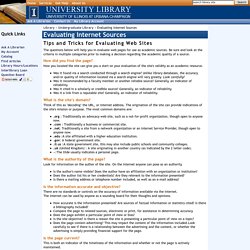
Be sure and look at the criteria in multiple categories prior to making a decision regarding the academic quality of a source. How did you find the page? How you located the site can give you a start on your evaluation of the site's validity as an academic resource. Was it found via a search conducted through a search engine? Unlike library databases, the accuracy and/or quality of information located via a search engine will vary greatly.